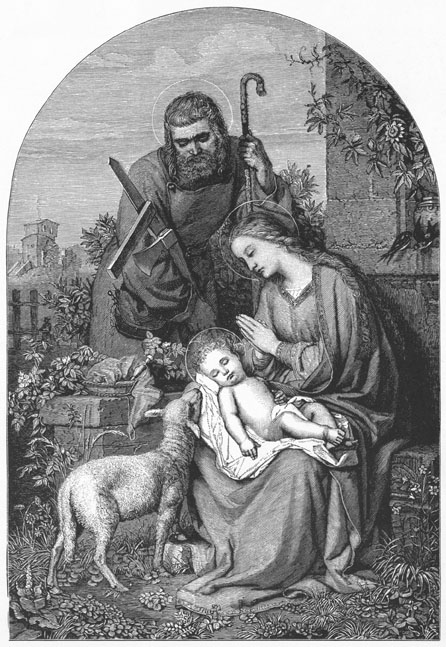
The curtain rises on the interior of a stable. The time is over 2000 years ago, a time of darkness, when according to legend even the nightingales had not yet learned to sing. It is just before dawn.
Joshua, a shepherd boy, sits dejectedly, talking to a little brown bird, who cannot answer him. It is Timothy Nightingale, Joshua’s friend and confidant. We learn that fear has driven the boy into hiding: fear of the lion, the wolf and the dark. He is filled with despair at his own weakness, and he likens his plight to Timothy’s: what place is there in the world for a shepherd who is afraid and abandons his flock? What place for a bird with no song to sing?
Suddenly the Rooster crows: it is dawn. “Awake, awake,” he sings, “the Christ is to be born, awake!” The other animals leap up excitedly, “When? Where?”. “This very night, in Bethlehem of Judea,” he answers. The four animals―Lord General Rooster, William the Goat, Celeste the Cow and Ambrosius the Lamb―immediately prepare to leave for Bethlehem. In answer to Joshua’s questions, they tell him of the promise made to them by Grandfather Noah, that a King would one day be born who would understand and love all creatures, animals as well as men; they are now going to rejoice at the scene of His birth. They invite Joshua and his silent Nightingale to accompany them, and all depart, singing songs of love and joy as they start on their journey.
The first Choral Interlude describes their journey, over deserts, mountains, and oceans, calling upon even the trees and the very stones of the earth to join them in a song of welcome to the newborn King. But as the Second Scene opens the Companions are lost at night in a deep, lightless forest. Even Timothy Nightingale, flying above the trees, can see no light or path ahead, and they are all in despair of finding their way through the darkness. Their noise awakens a Beetle from his seven-year sleep; but his annoyance changes to thanks when he learns of their pilgrimage, for he would otherwise have slept through the great event for which he too was waiting. They tell him of their plight, but the only lights he knows of are the stars, shining far above the forest roof. Riding upon Timothy’s back, he promises to bring down a small star to light them on their wayand the two mount into the skies as the scene ends.
The second Choral Interlude is a ballet describing the quest through the heavens for a star. The Beetle and Nightingale fly past Angels, who are on their way to Bethlehem. The Moon and the Constellations help to guide them on their way up to the stars from whose number they choose a small one, and happily fly back down towards Earth and their waiting friends. Below, the Third Scene opens on the other Companions huddled together around a dwindling campfire. Suddenly Ambrosius starts in fear: something is stalking them. In panic he runs around madly, finally running wildly into a thicket, straight into the waiting arms of Samson the Lion! “Weaklings!” he sneers, “I shall take my time to clean the wool from my teeth, before I catch you all for tomorrow’s meal!” In terror, all the animals look to Joshua for protection, and with fear and hesitation, he advances to confront the Lion with the only weapon he has: his music. Bowing to Samson, he praises his majesty, imploring him by the memory of the joy he knew in his mother’s gentle embrace, to spare the weak and give homage to the Lord of Light. And the Lion is moved. Listening to Joshua’s song, he relents, letting Ambrosius go and finally joining the Companions in their quest. Timothy and Sir Beetle return with the Star and the Company departs, guided by the Beetle’s star lantern and protected by Samson, arm in arm with Ambrosius, as Timothy, flying above, keeps watch.
In the third Choral Interlude, the Companions, “led by starlight, reached at last their destination: Bethlehem of Judea, where tonight a child is born, in a manger, in a stable”―the Baby Jesus. Scene Four is set inside the stable. Mary, Joseph and the Baby are hidden from view. The wayfarers are greeted by Balthazar the Donkey, to whom they sing of their experiences in finding their destination and the knowledge it has brought them: they have survived and conquered darkness and fear with light and music; and “the Lion is not killed, but a friend for evermore.” Balthazar responds that all of this is a token of what the little Princeling, born this night, will show all creatures by his life. And he reassures Joshua in particular that “it is natural to fear the dark.” He tells of his special part in the story: he has carried the Mother of God upon his back; and he calls upon them to kneel down in thanks that they have shared in this holiest of nights, as the Holy Family becomes visible in the back of the stable.
Ambrosius, William, Celeste and the Lord General each in turn offer their gifts to the newborn King. Joshua, Samson, Sir Beetle and Timothy are unhappy because they have no gifts. But suddenly the heavens open and the Angels descend. The Angel Michael tells them they do indeed have gifts to present, if they will. Then they step forward: Samson pledges to walk always in friendship, never again in blind anger or warfare; Joshua offers the gift of his music to amuse or move to tears. Sir Beetle jumps up: the star has become part of him and the Angel Michael christens him anew as “Firefly”, always to carry the starlight in memory of this night. “Alleluia!” sings Timothy, for here, in this wondrous birth, he has at last found his voice, which will echo forever the sound of the Angels’ song.
Together, Timothy and Joshua sing a lullaby to the Holy Child, and the Animals, Angels and Chorus join them: “Hearts full of music, light and love have no room for fear and darkness. Open portals stand before us. We shall dwell in joy and kindness forever! Alleluia! Amen!”
edited by Erwin R. Vrooman 2014
